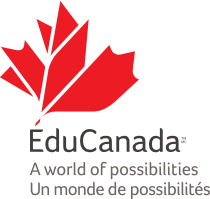Prepare your budget to study in Canada
It’s important to make sure you have enough funds to cover your expenses for living and studying in Canada. You can start by finding out about study costs for international students.
Next, you'll need to research your expected living costs.
Living costs
Your living costs will vary depending on your lifestyle and the city you choose to live in.
All estimates are in Canadian dollars and are subject to change. Find exchange rates with the currency converter from the Bank of Canada.
| Item | Cost estimate | More information |
|---|---|---|
Housing and accommodation | $500 - $2,000 per month | If you live in private housing off campus, rent in Canada is typically paid monthly. If you live in a student hall or residence on campus, you may need to pay your accommodation costs in full for the year. Accommodation costs depend on the city and your living arrangements. It's generally recommended to set aside 25% of your budget for housing. Learn more about housing and accommodation. |
Food and groceries | $240 - $480 per month | If you live off campus, you will likely do your own cooking or share cooking duties with friends. Research the costs online by looking at Canada’s major national grocery store chains. You can even download apps to compare costs or find the best deals. If you live on campus, you can register for the meal plan. This gives you access to your college or university cafeteria for all your meals. |
Utilities and cable | $100+ per month | - |
Internet | $50 - $100 per month | - |
Phone | $60+ per month | Costs will vary depending on whether you are buying a new phone or using one you already have. |
Health Insurance | $75 - $120 per month | In Canada, each province and territory provide health care to its citizens. As an international student, you need to determine whether your province or territory offers you health insurance. In provinces where there is no coverage for international students, your school will have medical insurance plans you can purchase. Often, tuition fees for full-time students include insurance which covers dental, vision, prescription drugs and other health services. Learn more about Canadian health care. |
Travel health insurance | Your school or travel agent can provide details on travel health insurance. | Travel health insurance is different from basic health insurance. You may need it if you’ll be in Canada for less than one year and you expect to live in different parts of Canada. This may apply to students planning to attend:
|
Entertainment | $120+ per month | Think about what you’ll want to spend money on for fun. This could include working out at a gym, going to the movies or eating at restaurants. It’s important to set money aside for relaxing and taking care of yourself. You can explore many parks, trails and beaches for free. Schools may also host free or discounted events for students, like concerts or festivals. |
Transportation | $80 - $156 per month for a transportation pass | Plan for your transportation costs by estimating how much money you’ll need for:
Many cities offer student rates for public transportation. If you’re a college or university student, check with your school to see if a transit pass is included in your tuition fees. Some international students choose to buy a car. If this is something you want to do, plan for the cost of your car, automobile insurance, gasoline, maintenance, repairs and parking. Many communities have bike paths in recreational areas and bike lanes on busy streets. Some major cities even offer bike-sharing services, where you can rent a bike for short commutes. For elementary and high school students, school boards generally provide school buses. In some cities, high school students use public transit to get to school. |
Discounts for students
Many airlines, bus companies and trains in Canada offer discounts to students. Find out about the international student identity card from the Canadian Federation of Students.
Income tax in Canada
As an international student studying in Canada, you may have to file a Canadian income tax return. Most international students are also eligible for benefits and tax credits.
You can learn about taxes for International students studying in Canada and benefits, credits, and taxes for newcomers from Canada Revenue Agency.
If you work on campus or outside, you must declare your income. Your income from scholarships, fellowships, or bursaries are tax exempt. Your school may offer information sessions on campus or a tax clinic where you can get your taxes done for free.
Learn more
- Budgeting for student life
- Budget planner
- Making a budget
- Service providers near me: Find television, Internet, mobile and phone service providers in your area
- Renting your first apartment or house
Keep exploring

Work while studying
International students can work while studying. Get job experience, help pay your tuition and build your network while you study.

Study costs
Learn about the cost of tuition for international students from elementary schools to universities, language schools and more.

Find a scholarship
Find out whether you’re eligible for a Canadian scholarship for your studies, research or professional development.
- Date modified:
